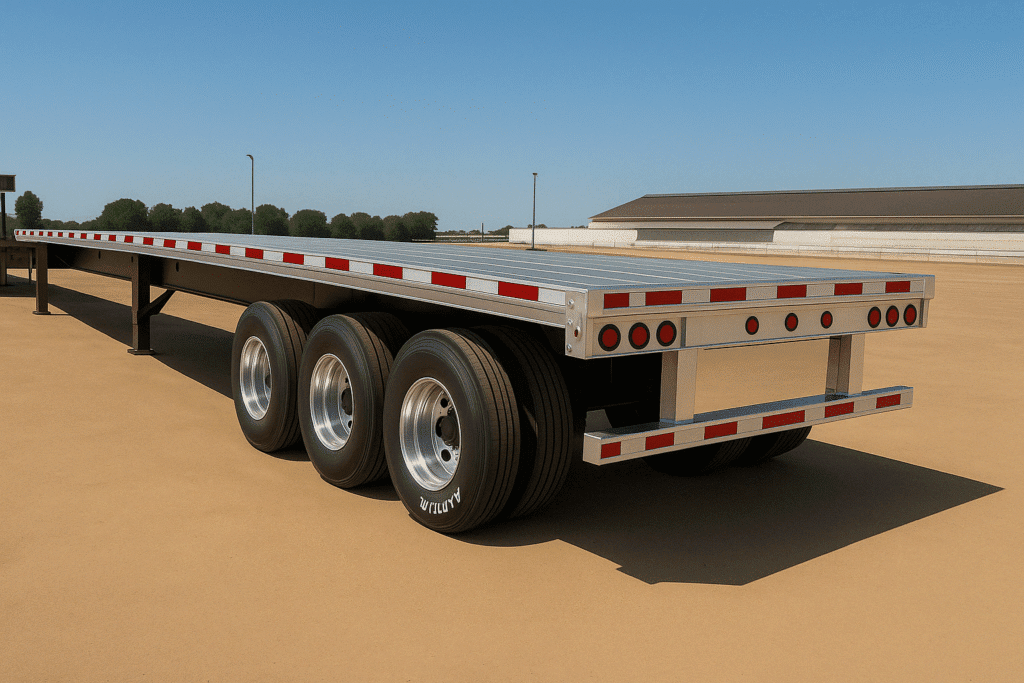When it comes to moving large, heavy, or bulky items, trailers can make the job a lot easier. One of the most common and useful types is the flatbed trailer. These trailers are used every day to carry all sorts of things—like wooden boards, large tools, farming gear, construction materials, big machines, and even vehicles.
Flatbed trailers are open on all sides, with no roof or walls, which makes loading and unloading much easier. But not all flatbed trailers are made the same. Some are built from steel, while others are made from aluminum.
In this guide, we’re going to talk about the aluminum flatbed trailer. We’ll explain what it is, why it’s a popular choice, and the situations where it works best. Aluminum trailers are a favorite for many people because they are lightweight, strong, and don’t rust like steel.
Whether you’re a truck driver, a small business owner, or just curious about trailers, this article will help you understand aluminum flatbeds better. Let’s dive in and learn more!
What Is an Aluminum Flatbed Trailer?
An aluminum flatbed trailer is a type of trailer that doesn’t have any sides or a roof. It’s built mostly from aluminum metal, which makes it strong but still lightweight. The main part of the trailer is a flat surface—called the bed or deck—where the cargo sits.
Because there are no walls or a top, it’s really easy to load and unload things from the back, the sides, or even from above using a forklift or crane. That’s why flatbeds are great for carrying large, long, or oddly shaped items.
Since this trailer is made out of aluminum instead of steel, it’s much lighter. And that makes a big difference. A lighter trailer is easier to pull, saves fuel, and lets you carry more cargo without going over weight limits. We’ll talk more about why this is so important in the next sections.
Why People Like Aluminum Flatbed Trailers
Aluminum flatbed trailers are becoming more popular each year. Let’s take a look at the main reasons why so many people are choosing them.
1. They Are Lighter
Aluminum weighs less than steel. That means an aluminum trailer is lighter to pull, which makes your truck work less. This can save money on fuel, and it can also make your truck last longer.
If your trailer is lighter, that means you can carry more cargo without going over your weight limit. This is important for people who haul things for work.
2. They Don’t Rust
One of the biggest problems with steel trailers is rust. When steel gets wet over time, it can start to break down. This rust can make a trailer look bad, and it can make it weak, too.
Aluminum doesn’t rust like steel does. It can still change color or get dirty, but it doesn’t get weak from rust. This means aluminum trailers last longer in places with rain, snow, or salty roads.
3. They Need Less Maintenance
Because aluminum doesn’t rust and doesn’t need paint or protective coatings, it’s easier to take care of. You don’t need to sand off rust or repaint it as often.
This saves time and money, especially for people who use trailers for work every day.
4. They Are Easier to Pull
Since aluminum trailers are lighter, they are easier for your truck to pull. This makes driving safer and smoother, especially on long trips or in bad weather.
You’ll also notice better braking and easier turns when hauling a lighter trailer.
5. They Look Great
Aluminum trailers usually have a clean, shiny look. They don’t need paint, and they don’t peel or fade the way some steel trailers do.
This can be helpful for businesses that want to look professional on the road. A good-looking trailer shows customers that you take care of your equipment.
6. They Keep Their Value
Because aluminum trailers don’t rust and stay in better shape, they are worth more money if you want to sell them later.
Even after years of use, a well-kept aluminum trailer can sell for a good price. This makes them a smart investment for many people.
What Are the Downsides of Aluminum Flatbed Trailers?
Even though aluminum trailers have a lot of good points, they aren’t perfect. Let’s talk about a few of the downsides.
1. They Cost More at First
Aluminum trailers usually cost more than steel trailers when you buy them. If you’re just starting out or working with a small budget, this might be hard to afford.
But keep in mind: over time, you might save money with aluminum because it lasts longer and needs less upkeep.
2. They Can Be Weaker in Some Ways
Aluminum is strong, but it can also be more brittle than steel. That means it can crack instead of bend under heavy stress.
If you’re hauling very heavy or rough loads, or working on rough terrain, you might need extra support in your aluminum trailer to avoid cracks.
3. Harder to Repair
Aluminum trailers need special tools to repair. Not every repair shop can weld aluminum the right way, and those that can may charge more.
This means if your trailer gets damaged, it might take longer or cost more to fix.
4. Not Always Best for Off-Road Use
Because aluminum is lighter and sometimes more fragile than steel, it may not be the best choice for extreme jobs. If you’re driving on rough roads or hauling big construction equipment in muddy areas, a heavy-duty steel trailer might be safer.
When Should You Choose an Aluminum Flatbed Trailer?
Now that we know the pros and cons, let’s talk about when an aluminum flatbed trailer is the best choice.
1. Long-Distance Hauling
If you’re driving across the country or making long trips often, aluminum trailers are a great option. They save fuel, reduce wear on your truck, and hold up well in all kinds of weather.
2. Regular Use in Wet or Salty Areas
Do you live near the ocean or drive on salty winter roads? Aluminum doesn’t rust, so it’s perfect for wet places.
If you’re in the north, where roads are often salted in winter, aluminum will last much longer than steel.
3. Hauling Medium-Weight Cargo
Aluminum trailers work great for moving things like:
- Furniture
- Tools and supplies
- Pallets
- Lawn and garden equipment
- Light to medium construction materials
If your load isn’t too heavy, aluminum is a smart, safe choice.
4. When Appearance Matters
If you run a company and your trailer is part of your brand, aluminum trailers look clean and sharp. They help you make a good impression with clients and customers.
5. If You Plan to Resell Later
Aluminum trailers stay in better shape, which means they’re easier to sell if you want to upgrade or get a different size later.
Different Types of Aluminum Flatbed Trailers
There are many kinds of aluminum flatbed trailers. Here are some of the most common ones:
1. Standard Aluminum Flatbed
This is the most basic kind. It’s flat with no sides, and it’s perfect for loading from any angle.
Best for: general freight, lumber, or packaged goods
2. Gooseneck Aluminum Trailer
This type connects to a ball hitch inside the bed of a pickup truck. It gives better control, especially for longer or heavier loads.
Best for: long-distance hauling, tall loads, or heavy loads
3. Utility Aluminum Trailer
These are smaller flatbeds, sometimes with short sides. They’re great for personal or light-duty business use.
Best for: mowers, ATVs, tools, and small machines
4. Tilt Deck Aluminum Trailer
The bed of this trailer tilts, so you can load things without ramps. This makes it easier to roll things on or off.
Best for: small vehicles, lawn equipment, or anything with wheels
How Much Can Aluminum Flatbed Trailers Carry?
How much your trailer can carry depends on:
- The trailer’s size
- The number of axles
- The type of hitch
Here are some basic numbers for 48 ft and 53 flatbeds:
| Trailer Type | Weight Limit (approx.) | Pallet Capacity |
| 48 ft Flatbed | up to 48,000 lbs | 24 standard pallets |
| 53 ft Flatbed | 48,000 to 52,000 lbs | 26 standard pallets |
Always check your trailer’s weight rating before loading it. Going over the limit is dangerous and illegal.
Tips for Taking Care of an Aluminum Flatbed Trailer
Even though aluminum is low-maintenance, you still need to take care of it. Here are a few simple tips:
- Wash It Regularly – Keep it clean, especially after driving on salty or muddy roads.
- Check for Cracks or Loose Bolts – Look over your trailer before each trip.
- Use the Right Tie-Downs – Make sure your load is secure and doesn’t damage the trailer.
- Avoid Overloading – Stay within your weight limit to avoid damaging the trailer or your truck.
Conclusion: Is an Aluminum Flatbed Trailer Right for You?
An aluminum flatbed trailer is a smart choice for many people. It’s lighter, won’t rust, and needs less care than steel. It’s easier to tow, lasts longer, and looks great on the road.
It may cost more at first, and it’s not always perfect for heavy or extreme jobs—but for most drivers and small businesses, the pros far outweigh the cons.
If you want a trailer that’s reliable, easy to use, and holds its value, aluminum is worth a closer look. Whether you’re hauling for work, travel, or a growing business, this type of trailer offers a strong return on your investment.

